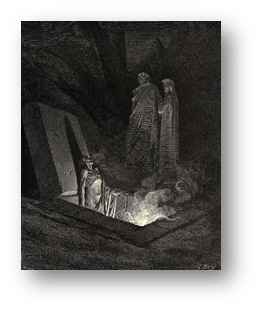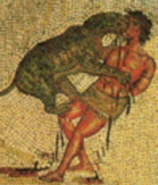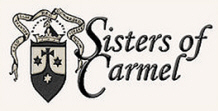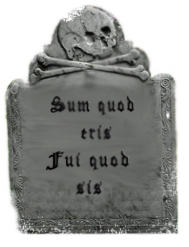|
A HELL
OF A SITUATION
|
|
The rich man also died and was buried and from the netherworld, where he was in torment ... [he cried out] I am suffering torment in these flames. ... warn them, lest they too come to this place of torment. (St. Luke 16:19-31) |

The
Hell there isnt!
It
is frighteningly odd.
We no longer hear of of Hell ... although we see it leaching
into our lives and the lives of those around us everywhere it
crouches, either feeding on our malice and greed, or lurking in some
obscure corner of our lives that shrinks from the light.
Contrary to
progressive
theological speculation, Hell has not been abolished ... nor has its
rage abated. Look around you.
Like children fearing to invoke the very evil they fear through merely uttering it, we have somehow convinced ourselves that if we resolutely ignore Hell, it will go away; that if we pretend that there is no such place, then it will become a fiction and therefore we have nothing to fear ... and also nothing to avoid. It is we are told, and therefore tell ourselves a quaint vestige of pre-enlightened and distinctly medieval thought, of long gone days of dismal dogma; in fact a notion abolished after Vatican II as unkind, as severe, and therefore unworthy of God. This is not true.
But still, we whistle in the dark as we pass a graveyard or a place
of darkness fraught with a sense of looming evil. Odd. Very odd.
Despite all that Christ has told us, all that Holy Mother the Church
has taught us, we will not hear of it ... we insist on our
way. Christ knows this. That is why He gives us the Parable of the
Rich Man.1 Do you doubt it?
Ask yourself this: have you ever (that is to say, even once) been to a funeral Mass where the bereaved are not told, indeed, completely assured, that their dead (who, like the rest of the congregation, had apparently never sinned) are already in Heaven smiling down benignly on our obsequies even as we utter them?
The real illusion ... and it is not Hell
It matters not that the departed were cruel and miserly, utterly indifferent to the poor; that they profited from the pain, misery, sin and degradation of others, caring nothing for God and even less for men and we know it! We knew it while yet they lived, and were ourselves often keenly aware of their selfishness, their lust, pride, and greed even their open depravity. Unrepentant to the moment of that clap of thunder that ended the illusion of tomorrow, they went to death as they had lived and we celebrate their lives ... instead of trembling before their death. In the lowest octave of our celebration we instinctively discern a deeply dissonant note that is discordant with our carefully revised narrative. It is deeper than the human voice, and more ancient still. We know that we celebrate a fiction of our own making to dispel the remorseless truth that stirs uneasily within us: that Heaven alone is not, after all, the abode of all our dead; that we have something to deeply lament, rather than celebrate; in fact something to fear rather than to rejoice in.
Incredibly, it has become not just the same fiction but the narrative of Jorge Bergoglio (Pope Francis) despite all that Christ said to the contrary!
Has the question, let alone the concern, of the deads urgent and utter need for every possible prayer ever once so much as arisen? Are we ever invited, urged, to so much as pray for our dead? * Are they not in need of our prayers? They were in life, yes? But somehow death appears to have abrogated this necessity. For all practical purposes and appearances, being dead is synonymous with being canonized. The dead, in every aspect of todays liturgy, are, as it were, by right (and rite ...) in virtue of the fact that they are dead already in the company of the Angels and Saints.
Strangely enough, we acknowledge ourselves to be sinners if
we acknowledge sin at all but in a remarkable dispensation that quite
suddenly becomes concomitant with death, not the recently
departed ... who yesterday was
one
among us,
that is to say, a sinner also. What he needs most, the
celebrant
carefully contrives to conceal from us: the need of our prayers.
One day perhaps this day I will need them ...
and so will you.
We no longer pray for our dead
Why is this?
Praying for the dead is very closely connected to a sober recognition
of the reality of ... other alternatives than Heaven.
Lesser alternatives, frightening alternatives, even
everlasting alternatives. We wish to spare our dead either a measure
of that privative state of purgation preparatory to Heaven through the
suffrage of our prayers, or were it possible, the pains of Hell through
an impassioned petition to the Judge.2 In any event, the
outcome at least admits of doubt in terms of clearly distinguishable
consignments.
Monuments and mirrors
For many years we could find the following inscribed on tombstones both in Europe and America:
|
Sum quod eris |
|
fui quod sis |
It was as much a reminder of the brevity of this life as an admonition to live our lives in recognition of realities that we cannot avoid, minimize, or simply wish away and that these realities, moreover, will correspond with how we have lived.
Of two things we are certain: that we die, and that following our death we will either live forever or we will not.
If we do not live forever, we have nothing to hope for and nothing to fear. Whatever we are at the moment of our death, will be, as it were, the last syllable in an ill-stated premise of meaning that never purposed to attain to a coherent conclusion because it could not. Without either hope or fear, then, we stare into the absence of being not as an eternal nothing, passively, if vacantly, witnessed in abstraction by a still inexplicable but nevertheless palpable consciousness aware of endless, unpunctuated, duration. we are an abstract argument against a plea for being. We are atheists which is a polite word for nihilists are atheists, and everything ultimately culminates in nothing. But if we are Catholics, we do we have an abundance of the one or the other: either much to hope for or much to fear.
We reject the first option offhand, that is to say, the notion that death brings total extinction. We are ... after all ... Catholics, and that flies in the face of everything Christ said and did.
But neither do we embrace the alternative (of either much to hope for or much to fear), at least in the eschatological terms enunciated by Christ Himself involving death, judgment, Heaven, and Hell.
We cannot have both.
Neither, then in our preferential and subjective cosmology that accords with neither reason nor revelation can we have a Heaven and a Hell. So we abolish Hell much in the way that we may succeed in abolishing Mount Aetna by our preferring to say that it is not there, despite persistent and troubling reports that it is.
Dives, the rich man in this parable, would have a decidedly different
opinion on the matter were he present to offer it, but Dives is being
... detained. Indefinitely. Even eternally. Or Christ is a liar.
Go
to my brother,
he would importune us, as he did Abraham. Unfortunately, we ourselves
would tell him very much what Abraham told him:
It
would be of no avail.
They
think you're in Heaven!
The priest told them so; he assured
them ... remember? They think that you are looking down
on them, having no clue that, could you see, all that you would see
of them would be the soles of their shoes!
Its a hell of a situation: Priest, Rabbi, Minister, even their psychologists,
are all of one accord: there is no such thing as Hell. To which we respond:
The
Hell there isnt!
Ah, the price of constant gratification!
Yes, such lies console the bereaved, but are a definite disservice
to the dead who stand much in need of prayer and, could they tell
you, would be eternally grateful for it.
But even if they did like the rich man in the parable you
would not believe them either ... would you?
______________________________________
* Of course, during the Mass the names of those who have died recently are, in fact, announced, and a perfunctory prayer is offered for them but rarely with pleas for mercy since mercy presumes sin ... and the hope of forgiveness by God.
Editor
Boston Catholic Journal
Comments? Write us: editor@boston-catholic-journal.com
______________________________________________________________________________
1 There was a certain rich man, who was clothed in purple and fine linen; and feasted sumptuously every day. And there was a certain beggar, named Lazarus, who lay at his gate, full of sores, desiring to be filled with the crumbs that fell from the rich mans table, and no one did give him; moreover the dogs came, and licked his sores. And it came to pass, that the beggar died, and was carried by the angels into Abrahams bosom. And the rich man also died: and he was buried in hell. And lifting up his eyes when he was in torments, he saw Abraham afar off, and Lazarus in his bosom: And he cried, and said: Father Abraham, have mercy on me, and send Lazarus, that he may dip the tip of his finger in water, to cool my tongue: for I am tormented in this flame. And Abraham said to him: Son, remember that thou didst receive good things in thy lifetime, and likewise Lazareth evil things, but now he is comforted; and thou art tormented.
And besides all this, between us and you, there is fixed a great chaos: so that they who would pass from hence to you, cannot, nor from thence come hither. And he said: Then, father, I beseech thee, that thou wouldst send him to my fathers house, for I have five brethren, that he may testify unto them, lest they also come into this place of torments. And Abraham said to him: They have Moses and the prophets; let them hear them. But he said: No, father Abraham: but if one went to them from the dead, they will do penance. And he said to him: If they hear not Moses and the prophets, neither will they believe, if one rise again from the dead. (St. Luke 16.19-31)2 Saint Luke 18.1-8
Totally Faithful to the Sacred
Deposit of Faith entrusted to the Holy See in Rome
Scio
opera tua ... quia modicum habes virtutem, et servasti verbum
Meum, nec non negasti Nomen Meum
Copyright © 2004 - 2026 Boston Catholic Journal. All rights reserved. Unless otherwise stated, permission is granted by the Boston Catholic Journal for the copying and distribution of the articles and audio files under the following conditions: No additions, deletions, or changes are to be made to the text or audio files in any way, and the copies may not be sold for a profit. In the reproduction, in any format of any image, graphic, text, or audio file, attribution must be given to the Boston Catholic Journal.
|























